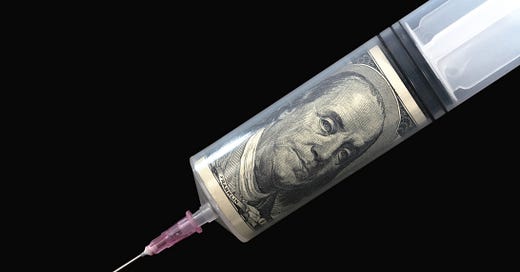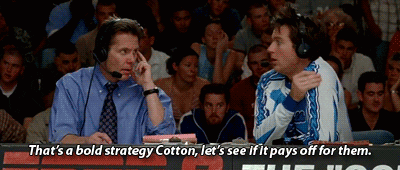
TNB is coming! This week I’ll be joined by Mona Charen, Bill Kristol, and Tim Miller.
It’s exclusive for Bulwark+ members. Come hang out with us.
1. Vaccine Bribery
The Great State of West Virginia has decided to pay people to take the free vaccine that it is giving away.
But it’s not just the banjo Mensa crowd that’s into vaccine bribery. In Maryland, The Good Republican, Larry Hogan, has started a program to give state employees $100 for getting the vaccine.
Here’s longtime Republican playa Rory Cooper (not the NC gov) weighing in on these schemes:

What do we think?
There are a few ways to think about vaccine bribery. The first is to separate mild incentives from outright bribery. There are private parties—local breweries, for instance—which are giving people a beer when they get vaccinated. In Detroit, the government is giving people $50 if they drive someone to get their vaccine.
I don’t view either of these are real bribery. In the case of the beers, it’s a private party doing the donation. In the case of the drivers, it’s closer to compensation for taking time out of your day to help someone else.
The real issue is the government paying people to take something for free—those cash payouts to people who have thus far refused to get vaccinated.
If you wanted, you could justify these programs on cost alone. Ounce of prevention, pound of cure, etc.
If you didn’t want to be so cold-blooded, you could justify them based on the idea that all life is precious and it’s worth spending money to save people from their own bad choices. Even if the expenditures don’t pay for themselves.
If you didn’t want to be so altruistic, you could justify it on public health grounds: This is really about slowing the emergence and spread of variants and protecting vulnerable populations who can’t tolerate the vaccine.
Intellectually, I’ll cosign onto all three of those rationales. They absolutely make sense. I’m sure they’re the right reasons and that using our tax dollars to bribe idiots who are endangering themselves and others is the wise course of action.
And yet . . .
Should we pay people not to rob banks?
Okay, that’s not fair. It’s a faulty analogy.
I mean, sure, bank robbing is bad. It’s dangerous for the robber, dangerous for the people in the bank. And because the stolen money gets repaid to customers by the federal government, robbing a bank imposes a measurable cost on all of society.
But the analogy breaks down because you can’t actually pay someone not to rob a bank. You can pay them, sure. But after the payment is disbursed, you have no control over their bank-robbing behavior. They could still decide to rob a bank.
How about this: Do we pay people to get sterilized? This analogy is a little bit closer to the mark. Sterilization is less reversible than a decision of whether or not to rob a bank. There are societal costs to children. (As well as societal benefits! Don’t @ me. I literally wrote the book on this.) Which is why paying people to get sterilized is a practice that you see from time to time.
A bad practice! We are against paying people to be sterilized! It’s monstrous and should never be done!
So maybe that analogy isn’t perfect, either.
But it’s closer than a bunch of other examples: Do we pay people to stop smoking or stop doing heroin? (Those are addictions more than objective choices.) Do we pay people to exercise? (Fitness has economic effects for society, but not downstream consequences for the rest of society’s health.)
Maybe the best example is just another form of vaccine: Do we pay people to get a flu shot every year?
But maybe the bank robbing analogy isn’t so wrong. Because of this:
If you were going to try to reduce robbery, you wouldn’t want to pay everyone. You would only pay the people with a history of larceny, since they’re the ones most likely to rob a bank.
In other words: The people following the law would not get paid not to rob banks. Only the lawbreakers would get paid.
Which is kind of where we are on vaccines. The people refusing to get a COVID vaccine are, by and large, the people who helped spread this pandemic by not taking the virus seriously in the first place. They’re the eNd THe LOcKdOwNS crowd. The anti-maskers. The people who freak out about vaccine passports.
In other words: They’re the people who helped make COVID so widespread and so deadly in this country.
If we were talking about paying them to change their behaviors back in January, when the biggest risk they posed was to wider society, then that would be one thing. But now that the vaccine is widely available, someone refusing to get it is mostly—not entirely, but mostly—assuming the risk for themselves.
Maybe we ought to let them I’m Ron Burgundy?
I guess the question comes down to this: There are obvious short-term societal benefits to getting more people vaccinated, even if we have to bribe them to do it.
But there are also going to be long-term societal benefits to people experiencing reality. If a guy is walking around with a hammer and every few steps he tries to hit his own thumb, how many times should you stop him? At some point, you have to move on with your life, let him smash his thumb, and then adjust his future choices accordingly.
There’s a deep level of paternalism in offering to pay grown-ass adults to take a free, life-saving vaccine. Like most forms of paternalism, this is well-meaning. It aims to protect people from the consequences of bad choices.
Maybe you can justify paternalism when the reason people make bad choices is a lack of resources—intellectual, educational, societal. But in the long run, I’m not sure how well paternalism works when the bad choices are being driven by decadence. Because the best cure for decadence is reality.1
I’ll just offer one final question: If it’s reasonable to pay people $100 to get the vaccine today, why would it be unreasonable to up that to $500 next month? Or $1,000 come September? If pure utility is the right answer, then we ought to keep sliding the scale until we hit the price point where every gettable anti-vaxxer has been bought off.
And if we’re not willing to do that, then it tells us something about the entire notion of vaccine bribery.
2. Why Can’t We Laugh?
Last week, the news broke that the editor of Believer magazine, Joshua Wolf Shenk, had suddenly stepped down.
I love Believer. It’s a tiny, beautiful literary magazine run out of Las Vegas. I’m a subscriber and I periodically link to their stuff in the third item.
Anyway, what happened is this:
In a farewell letter shared with the staff, Shenk said his resignation followed "a dumb, reckless choice to disregard appropriate setting and attire for a Zoom meeting. I crossed a line that I can't walk back over. I sorely regret the harm to you — and, by extension, to the people we serve. I'm sorry."
I know what you’re thinking—that sounds like a Jeff Toobin situation. But the reality seems closer to an Ian Grimm situation:
The incident occurred during a video meeting in early February with about a dozen staff members of the Believer and BMI, according to three sources who were in the meeting. According to Ira Silverberg, a literary agent and editor who is acting as Shenk's adviser, Shenk was soaking in a bathtub with Epsom salts during the meeting to alleviate nerve pain caused by fibromyalgia.
He had chosen a virtual background to mask his location and had worn a mesh shirt. When Shenk's computer battery died, he got up to plug it in, believing the camera was off. But the video kept running.
And here’s the kicker: Shenk immediately self-reported to HR that he had accidentally flashed his dong.
Isn’t this . . . kind of funny? Like a scene from Curb Your Enthusiasm? Isn’t it the kind of thing that we’re supposed to laugh about? That becomes part of the legend of the weird literary editor? I’m not going to lie: I like to imagine that something similar once happened to William Shawn. And then Dorothy Parker and John Updike mocked him for it relentlessly. And finally, on the day Mr. Shawn died, the New Yorker staff smiled remembering the story.2
Now maybe there’s a deeper story here. Maybe this wasn’t a one-off. Or maybe Shenk was a tyrant and everyone hated him and this was just getting Al Capone for tax evasion. I don’t know. It’s not my magazine.3
But if the situation really is as reported, then this is not, as Shenk says, a “harm” which cannot possibly be repaired. It’s a human foible, a screw-up, one of those pandemic stories that a healthy society would laugh about as we try to make it through a prolonged period of grief and tumult. It’s the kind of thing that we should laugh about not (just) because it’s funny, but as an act of grace.
I love the Believer and I hope the magazine continues to prosper, no matter what. But even more than that, I want us to live in a world where we can laugh at our stupid, honest mistakes and view them as a form of fellowship, rather than harm.
3. Nostalgia and the Hurst/Olds
I’ve linked to Regular Car Guy before, but this episode about the Hurst/Olds is a masterpiece and it’s worth watching even if you’re not all that into cars.
Why?
Because it’s about the deep human affinity for nostalgia. And how corrupting it is.
For those of you who aren’t into cars, the link here will take you to the 7:21 mark, where the riff on nostalgia starts.
The key insight here is that the Hurst/Olds was “a manufactured lie.” It was a premium priced car (almost $50k in today’s dollars) designed to mimic the car culture of the early ‘70s. But it was rolled out in 1984 to sucker in the Boomers nostalgic for their teen years.
And so everything about the Hurst/Olds was fake—starting with the insane lightning shifter transmission set up.
What is that? It’s an automatic transmission for suckers.
Really and truly, I hope you’ll watch the whole thing. But if you’re super short on time, jump to the 10:31 mark where Mr. Regular hits on why nostalgia is so sad.
In America, cars have always been an expression of who we are. Or maybe, who we think we’d like to be.
With the Olds/Hurst, I’m not sure which option is more damning.
Don’t get me wrong: I’m officially #TeamHumanity.
To the best of my knowledge, this did not happen. At least not over Zoom. What goes on at the Algonquin, stays at the Algonquin.
And if the story isn’t as reported, then I take all of this back.













